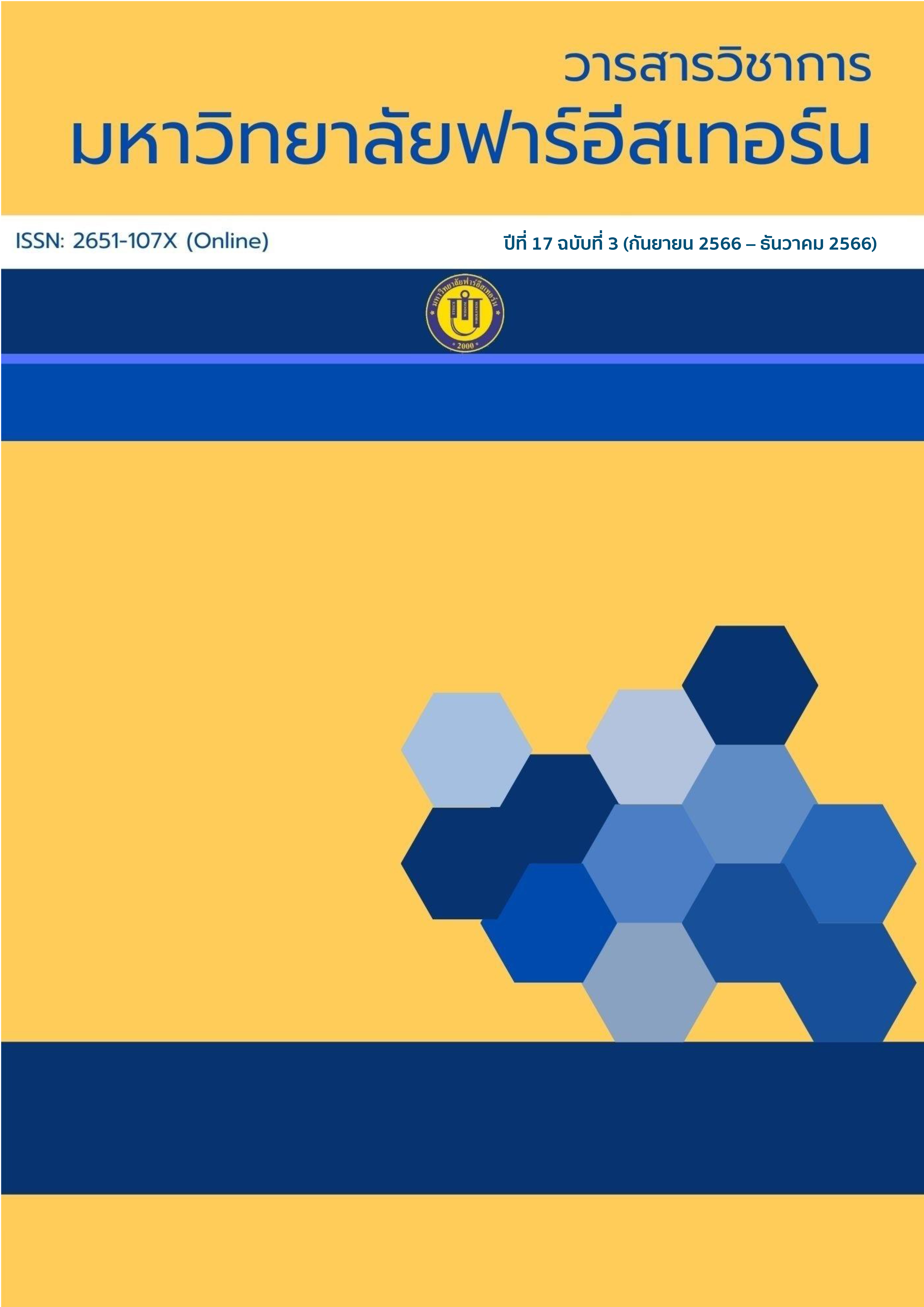Developing an Experience Manual Based on Computing Science (By Unplugged Coding) with Kids Code for Fun Media to Promote Basic Thinking Skills of Young Children
Main Article Content
Abstract
The objectives of this research are 1) to develop a manual for organizing basic thinking skills experiences for young children by learning experience provision based on computing science (by unplugged coding) with Kids Code for fun media and 2) Compare the basic thinking abilities of young children. Before and after organizing an experience using computational science learning activities with the use of Kids Code for fun media. The sample group was Children aged 5-6 years, Kindergarten 3, Semester 1, Academic Year 2023, Ban Mae Buan School, 20 people, were obtained from cluster random sampling. The research tools were 1) a manual for organizing experiences provision based on computing science (by unplugged coding) with Kids code for fun media to develop basic thinking skills for young children and 2) basic thinking ability assessment form Data analyzed by To find the efficiency of the manual, use E1/E2 statistics using the 80/80 criterion. Comparison of basic thinking abilities of young children using independent t-test statistics. The results of the research found that 1) a manual for organizing experiences in basic thinking skills for young children by learning experience provision based on computing science (by unplugged coding) with Kids Code for fun media has an E1/E2 efficiency of 94.57/93.89, which is higher than the specified standard efficiency criteria of 80/80. 2) young children who receive experiences provision based on computing science (by unplugged coding) with Kids Code for fun media between before and after the experience with a standard deviation value of 1.64 and 0.77 and a t-test value of 8.22.
Article Details

This work is licensed under a Creative Commons Attribution-NonCommercial-NoDerivatives 4.0 International License.
1. Any views and comments in the Journal of Social Innovation and Lifelong Learning are the authors’ views. The editorial staff have not to agree with those views and it is not considered as the editorial’s responsibility.
2. The responsibility of content and draft check of each article belongs to each author. In case, there is any lawsuit about copyright infringement. It is considered as the authors’ sole responsibility.
3. The article copyright belonging to the authors and The Far Eastern University are copyrighted legally. Republication must be received direct permission from the authors and The Far Eastern University in written form.
References
กนกวรรณ พิทยะภัทร์ และ ศิริวรรณ วณิชวัฒนวรชัย. (2558). การพัฒนาความสามารถในการคิดแก้ปัญหาและจิตวิทยาศาสตร์ของเด็กปฐมวัยที่ได้รับการจัดประสบการณ์ด้วยการสืบเสาะหาความรู้แบบ 5E. วารสารศิลปากรศึกษาศาสตร์วิจัย, 7(1), 1-11. https://so05.tci- thaijo.org/index.php/suedureasearchjournal/article/view/33205
กระทรวงศึกษาธิการ. (2560). หลักสูตรการศึกษาปฐมวัย พุทธศักราช 2560. กรุงเทพฯ: โรงพิมพ์คุรุสภาลาดพร้าว.
กระทรวงศึกษาธิการ. (2563). หลักสูตรอบรมการจัดประสบการณ์การเรียนรู้วิทยาการคำนวณระดับอนุบาล. กรุงเทพมหานคร: โรงพิมพ์ชุมนุมสหกรณ์การเกษตรแห่งประเทศไทย จำกัด.
ชยการ คีรีรัตน์. (2562). การใช้กระบวนการแก้ปัญหาและโปรแกรม App Inventor พัฒนาทักษะการคิดเชิงคำนวณ (Computational Thinking: CT) สำหรับผู้เรียนระดับมัธยมศึกษา. วารสารครุศาสตร์จุฬาลงกรณ์มหาวิทยาลัย, 47(2), 31-47. https://so02.tci- thaijo.org/index.php/EDUCU/article/view/195892
ชัยยงค์ พรหมวงศ์. (2556). การทดสอบประสิทธิภาพสื่อหรือชุดการสอน. วารสารศิลปากรศึกษาศาสตร์วิจัย. 5(3), 7-20. https://so05.tci- thaijo.org/index.php/suedureasearchjournal/article/view/28419
ธานินทร์ ศิลป์จารุ. (2552). การวิจัยและวิเคราะห์ข้อมูลทางสถิติด้วย SPSS (พิมพ์ครั้งที่ 10). กรุงเทพฯ: บิสซิเนสอาร์แอนด์ดี.
ธีราพร กุลนานันท์. (2561). ประสาทวิทยาการศึกษา: งานพัฒนาทุนมนุษย์ในปัจจุบันเพื่ออนาคต. วารสารครุพิบูล, 6(2), 169-183. https://so02.tci-thaijo.org/index.php/edupsru/article/view/189047
โรงเรียนบ้านแม่บวน. (2564). รายงานผลการประเมินตนเองโรงเรียนบ้านแม่บวน (SAR) ปีการศึกษา2564. เชียงใหม่: โรงเรียนบ้านแม่บวน สำนักงานเขตพื้นที่การศึกษาประถมศึกษาเชียงใหม่ เขต5.
สถาบันส่งเสริมการสอนวิทยาศาสตร์และเทคโนโลยี กระทรวงศึกษาธิการ. (2561). ตัวชี้วัดและสาระการเรียนรู้แกนกลาง กลุ่สาระการเรียนรู้วิทยาศาสตร์ (ฉบับปรับปรุง พ.ศ. 2560) ตามหลักสูตรแกนกลางการศึกษาขั้นพื้นฐาน พุทธศักราช 2551. กรุงเทพพฯ: โรงพิมพ์ชุมนุมสหกรณ์การเกษตรแห่งประเทศไทย.
สำนักงานคณะกรรมการการศึกษาขั้นพื้นฐาน. (2560). หลักสูตรการศึกษาปฐมวัย พุทธศักราช 2560. กรุงเทพฯ: โรงพิมพ์คุรุสภาลาดพร้าว.
Kim Dae-wook. (2019). Concept and strategy of unplugged coding for young children based on computing thinking. The Journal of the Convergence on Culture Technology, 5(1), 297-303. https://doi.org/10.17703/JCCT.2019.5.1.297

